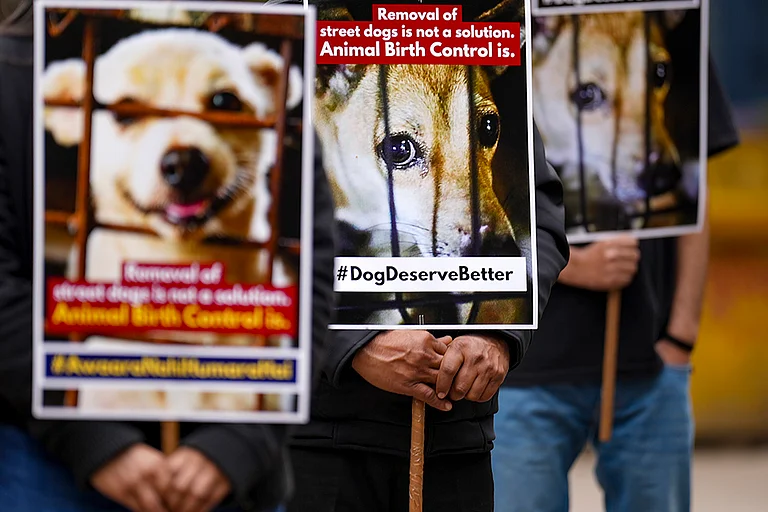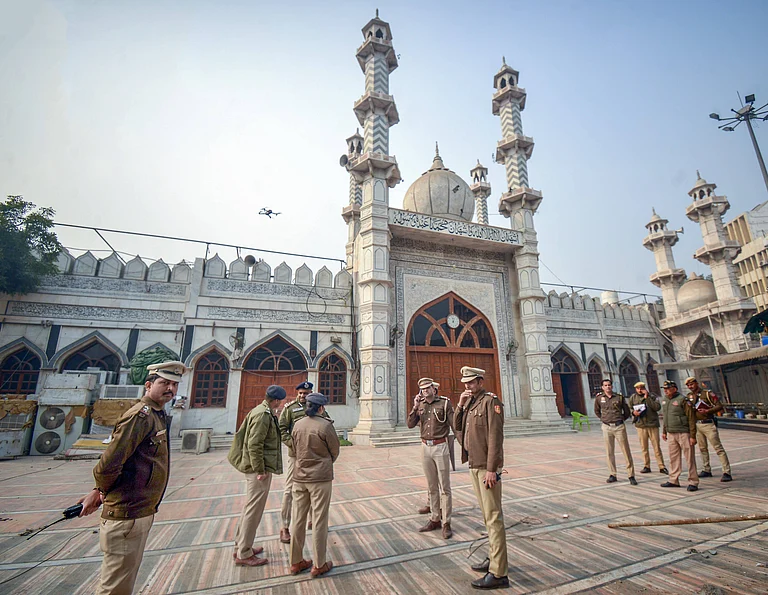
The Supreme Court ordered immediate removal of stray dogs to shelters in Delhi, Noida, Gurugram and Ghaziabad, warning of legal action against interference.
Demonstrators in Delhi’s Connaught Place faced heavy police presence on Tuesday; detentions followed.
At present, the Municipal Corporation of Delhi (MCD) reportedly runs 20 Animal Birth Control (ABC) centres in partnership with NGOs
On a Tuesday evening, uniformed police officers and CRPF personnel heavily outnumbered the demonstrators opposing the Supreme Court’s one-day-old ruling aimed at curbing the “menace of dog bites leading to rabies.”
Near Hanuman Mandir in Delhi’s bustling Connaught Place, the protestors overlooked the parked buses, ready to contain them as they awaited imminent detention.
The apex court on August 11 directed authorities in the National Capital Territory of Delhi to begin removing stray dogs from all neighbourhoods and relocating them to designated shelters without delay. The order also applies to Noida, Gurugram and Ghaziabad.
"Whether sterilised or not sterilised, society should be free from stray dogs.”
The bench cautioned that anyone — whether an individual or an organisation — who interferes with the removal process will face legal action. The Court further stated that the authorities are free to set up a dedicated team to carry out the task of picking up strays. The authorities have to begin constructing shelters, directing them to prioritise one that can house 5,000 dogs within the next six to eight weeks.
The order quickly culminated in a protest at India Gate on August 11, which ended with the detention of several demonstrators.
On Tuesday, even before a single slogan could be raised, police whistles pierced the air, followed by microphone announcements asking for demonstrators to disperse. “This is a court’s order which cannot be solved by gathering here— do not do this to yourself, explore your legal options instead,” uniformed officers shouted at regular intervals.
Barely 50 protestors stood their ground against the authorities, clutching placards bearing images of dogs, digitally altered alongside Hindu gods.
Shrutika and Arushi (names changed) had walked to the protest from their nearby office. Both employed in government jobs, they refused to be identified, fearing repercussions.
Commenting on the heavy security presence, one of them said, “I don’t even have to do anything — I just had to show up. Right now, their numbers exceed ours. It only shows that the government is scared. This fear is good; it keeps democracy healthy."
Shrutika added that if Delhi were deployed this heavily for the safety of women, she would be able to walk alone at night.
In yesterday’s ruling, the bench comprising Justices J. B. Pardiwala and R. Mahadevan stressed that once removed, the canines must not be released back onto the streets.
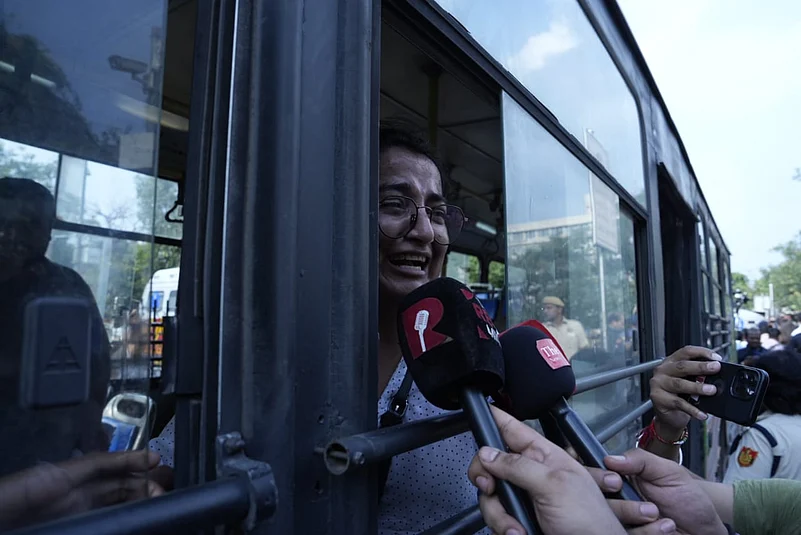
"Infants and young children, not at any cost, should fall prey to rabies. The action should inspire confidence that they can move freely without fear of being bitten by stray dogs. No sentiments should be involved," the Court stated.
The Supreme Court had initiated suo motu proceedings on July 28, after a news report highlighted the growing stray dog attacking children.
However, Shrutika claimed that the ruling makes no sense since the child who passed away due to the dog attack died of meningitis, not rabies. “This is another beautiful example of media sensationalism and fake news.”
Criticising the economic logic of the plan, she said that even at heavily subsidised rates, it would cost rupees 3–5 lakh a month to run a shelter housing just 100 dogs. “So if there are 10,000 such shelters, we’re talking about spending crores every month on dogs. We can’t even clear this kooda (garbage),” she remarked, pointing to the garbage pile on the roadside.
“What’s going to happen,” she continued, “is that Rekha Gupta [Delhi Chief Minister] will allocate a crores of taxpayers’ money to make Delhi’s streets dog-free — while some of the fund will be used for the shelters, rest will be siphoned off to buy my favourite politician’s LV scarf.”
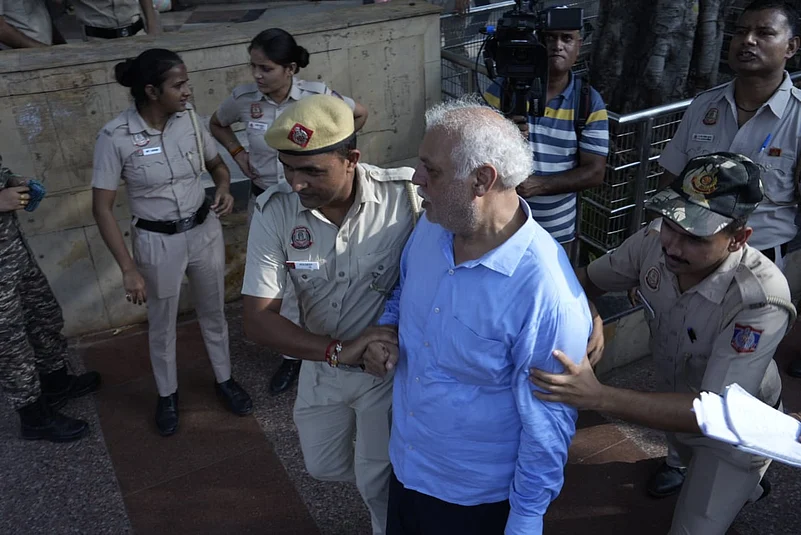
Gupta, meanwhile, said the “stray dog menace” had assumed “gigantic proportions” and assured that her government would bring in a policy soon. “Delhi people are fed up of stray dogs. We have been discussing on the issue. The Supreme Court’s directions are important. We want to provide relief to people. The problem (of stray dogs) has assumed gigantic proportion. We will form a policy and provide relief to people,” news agency PTI quoted Gupta as saying.
At present, the Municipal Corporation of Delhi (MCD) reportedly runs 20 Animal Birth Control (ABC) centres in partnership with NGOs. These serve as temporary holding facilities for sterilisation, where dogs are kept for up to 10 days post-surgery before being released back to their territories — a process mandated under the Animal Birth Control (Dogs) Rules, 2023.
The last citywide dog census was conducted in 2009, estimating the population at 5.6 lakh, according to media reports. A 2019 Delhi Assembly sub-committee put the figure at 8 lakh. No formal survey has been carried out in years.
Outlook India tried to contact the MCD with queries about the current dog population in the capital and the logistics planned to facilitate the Supreme Court directive, but calls went unanswered.
Anantika Kapoor, Co-Founder of Pooch Tales — a Delhi-based organisation working for street dogs — said that this “blanket judgement” fails to recognise that the MCD lacks both the infrastructure and the bandwidth to carry out such a task, highlighting that the order goes against the Animal Birth Control Rules (ABC), 2023, that mandates sterilisation vaccine and releasing the dogs in the area that they are picked up from.
“Currently, it's looking like a very minor thing, round up all the dogs and stuff them into shelters. Do they have the capacity to feed 10 lakh dogs? Do they have the manpower that would be compassionate enough to look after the daily feeding, the diseases, any medical conditions that may arise?” she asked, adding that the pounds are just “kill zones for these poor, vulnerable dogs.”
She further pointed out that there are currently no shelter homes for dogs in the capital region, and that government-run sterilisation centers don’t operate adequately. Kapoor questioned, if rabies — a controllable and preventable disease — is the reason behind the ruling, where the funds allocated for this purpose are going. “Private players like us have been doing it with absolutely no support from the government. So that’s my question.”
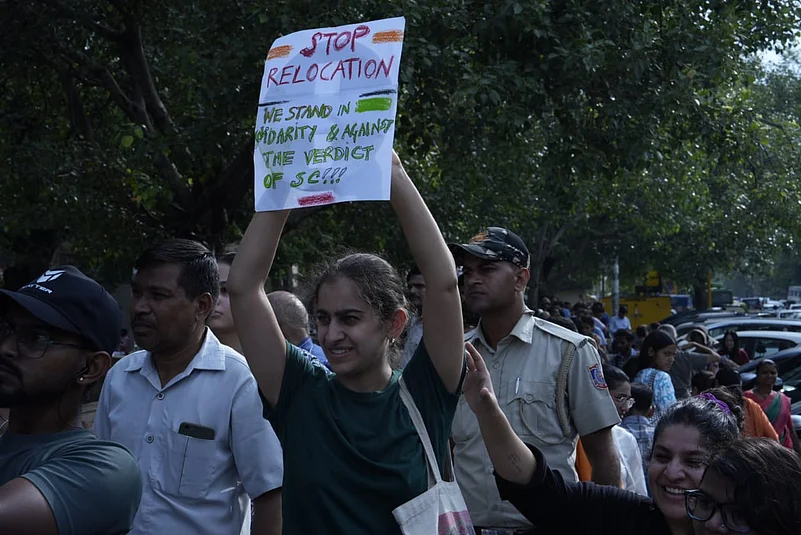
The Court said its ruling was made keeping in mind the larger public interest. But the protestors, gathered just metres from the Connaught Place police station, believed otherwise.
Ashima Sharma, a retired corporate employee, said she was shocked that the court passed such a major judgment in such haste. “What sort of a judgment is this? How can they put sterilised and unsterilised stray dogs together? They are territorial.”
In contrast, Sharma asked, “If a man were to eve-tease me, how many times would I have to go to the court and the police station, answering their obnoxious questions?”
Madhavi Bal, a lawyer who quit her profession to devote the past 25 years to caring for dogs, called the order “simply unbelievable,” expressing shock that dogs could be sent to pounds from where “our dogs” will never come back.
She added, “This is happening in a country where Ram Rahim, who has serious allegations levelled against him, is repeatedly let out of prison.”
As police officials dragged away the detained demonstrators behind her, she further remarked that the situation reflected the failure of the MCD, which had been unable to implement the ABC guidelines intended to regulate the stray dog population.
As elderly men and young women alike were hauled towards the bus, their feet scraping against the pavement, a protester already inside leaned out and shouted, “Look how they [police] are manhandling us — this is a peaceful protest.”
On the side of the road, Akriti tried to reason with a female police officer threatening that they will be put in the bus, insisting that simply protesting does not make one a “criminal.”
Speaking to Outlook, she said the gathering was nothing more than citizens trying to make their voices heard, as there seemed to be no other avenue. “The court says that they will only listen to the central government, which is an extremely odd thing to say,” she alleged.
According to her, it was clear that the issue served as a distraction from the matter of electoral fraud. However, since “children’s lives are at stake,” therefore energies had been diverted to this cause.
Other High Courts are following suit of the Supreme Court order. After Delhi NCR, the Rajasthan High Court on Monday ordered municipal bodies to clear stray dogs and other animals from city roads, instructing that the process be carried out with minimal physical harm to the animals.
Leader of Opposition, Rahul Gandhi — who last week alleged “vote chori” in Karnataka — too commented on the SC directive, stating, “These voiceless souls are not “problems” to be erased. Shelters, sterilisation, vaccination & community care can keep streets safe - without cruelty.” He added that the blanket removals are cruel and shortsighted.
Shrutika pointed out the irony of the judgment, acknowledging that while it is tragic when a dog bites a child, it must also be remembered that this is a country where dogs are skinned, burned alive, raped, and killed — and the culprits walk free on bail as low as ₹50. “You villainise an entire species based on the action of one dog,” she said.
She claimed that the directive was “headline-making” distraction politics aimed at diverting attention from the upcoming elections, “and unfortunately, our dogs have to pay the price.”










